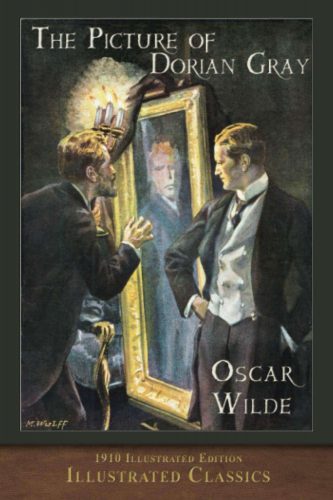 The Price of Pleasure
The Price of Pleasure
Author: Oscar Wilde
Would you commit a crime if there was a guarantee that you would never be caught? Would you experiment with all manner of evil and decadence if your face never revealed the cost of experience?
Young Dorian Gray is a blank slate. He is a beautiful man – a man so beautiful that he captures the imagination of Basil Hallward, a painter always in search of the perfect muse. But when Dorian meets Basil’s friend, Lord Henry, the impressionable young man is captivated by the cynicism, the depravity, the silken promise of living an uninhibited, sensual life. Just as the portrait is finished, Dorian has made his transformation, and his vanity cries out. If only he would never age, and the gorgeous picture, now hateful to him, would take the brunt of experience, would age for him so he could be young and uninhibited forever. As the old saying goes . . . be careful what you wish for . . .
As Dorian grows older, grows darker in his desires, seeks to follow Lord Henry’s example of pleasure over conscience, evil over good, knowledge over kindness, the picture morphs, but Dorian remains the same, un-plauged by consequences. Falling into the very shadow of selfishness.
The Picture of Dorian Gray is a cautionary tale, of course. As a teenager when I first encountered it, I loved the premise and was mesmerized by the growing physical effects of Dorian’s uninhibited experience on his portrait – something that became twisted, monstrous, eventually splattered in blood and malignant with misdeeds. Lord Henry and his diatribes bored me, and even now with more age, I found myself getting tired of this emissary of pleasure, but far more aware of his cunning, of the principle that bad friends corrupt good morals. Lord Henry’s philosophies here, which attract the indolent around him who are afraid to try the bad boy life, yet amazed and secretly envious of Henry’s blatancy and talk, are powerful in that they show how Dorian is lead to his fall, how the if-it-feels-good-do-it motif is a double-edged sword, provocative and yet deadly. It works together, and Wilde’s statement, beyond the incredibleness of his story and the hideous morphing of the picture that so spoke to my morbid teenage soul, is timeliness, acute, the talk of a man we feel has been through a harsh walk of life and learned something far too late. Perhaps Wilde did not have his own portrait. Perhaps he was intituve about the ways of the Lord Henry’s of the world and how misery ultimately loves company. Above all, he was a brilliant writer.
The story, of course, is not all philosophy and no action. Dorian’s fall from grace is just as sordid as could be desired, and as he seeks experience and pleasure, we see his character harden, even as his face remains unscathed by the cruelty of his personality. He leaves dramatic wreckage in his wake. He ruins lives. He literarily leaves bodies, and as the drama increases, he finally does the unthinkable (yet, truly, the inevitable). Half moral, half heart-pounding drama, this old story still hits close to home, still has fangs and claws ready to sink into the reader, and still leaves us glassy eyed, amazed at the last page, at the carnage that comes from a life of pleasure, and the duplicitous nature of that pleasure and the corruption of the human character. This is a classic that demands re-reading and just seems to grow better, more potent, more thoughtful, with age.
– Frances Carden
Follow my reviews on Twitter at: https://twitter.com/xombie_mistress
Follow my reviews on Facebook at: https://www.facebook.com/FrancesReviews
- Book Vs Movie: The Shining - April 6, 2020
- Thankful For Great Cozy Mysteries - December 13, 2019
- Cozy Mysteries for a Perfect Fall - October 20, 2019

